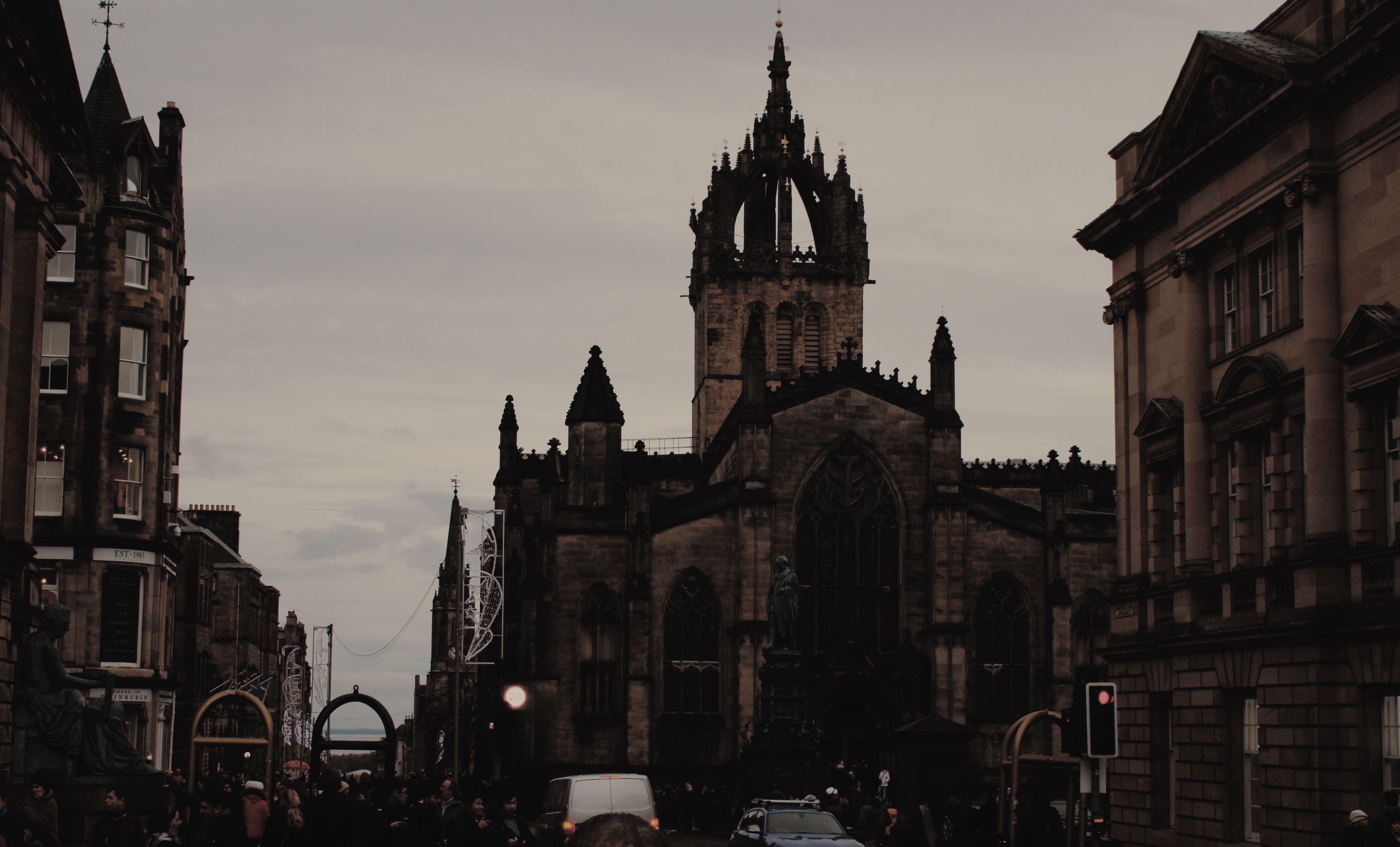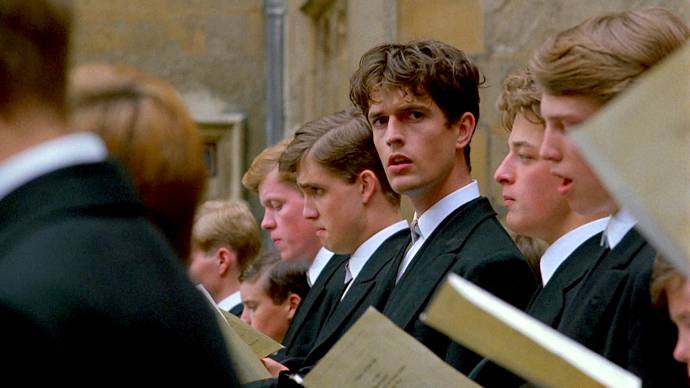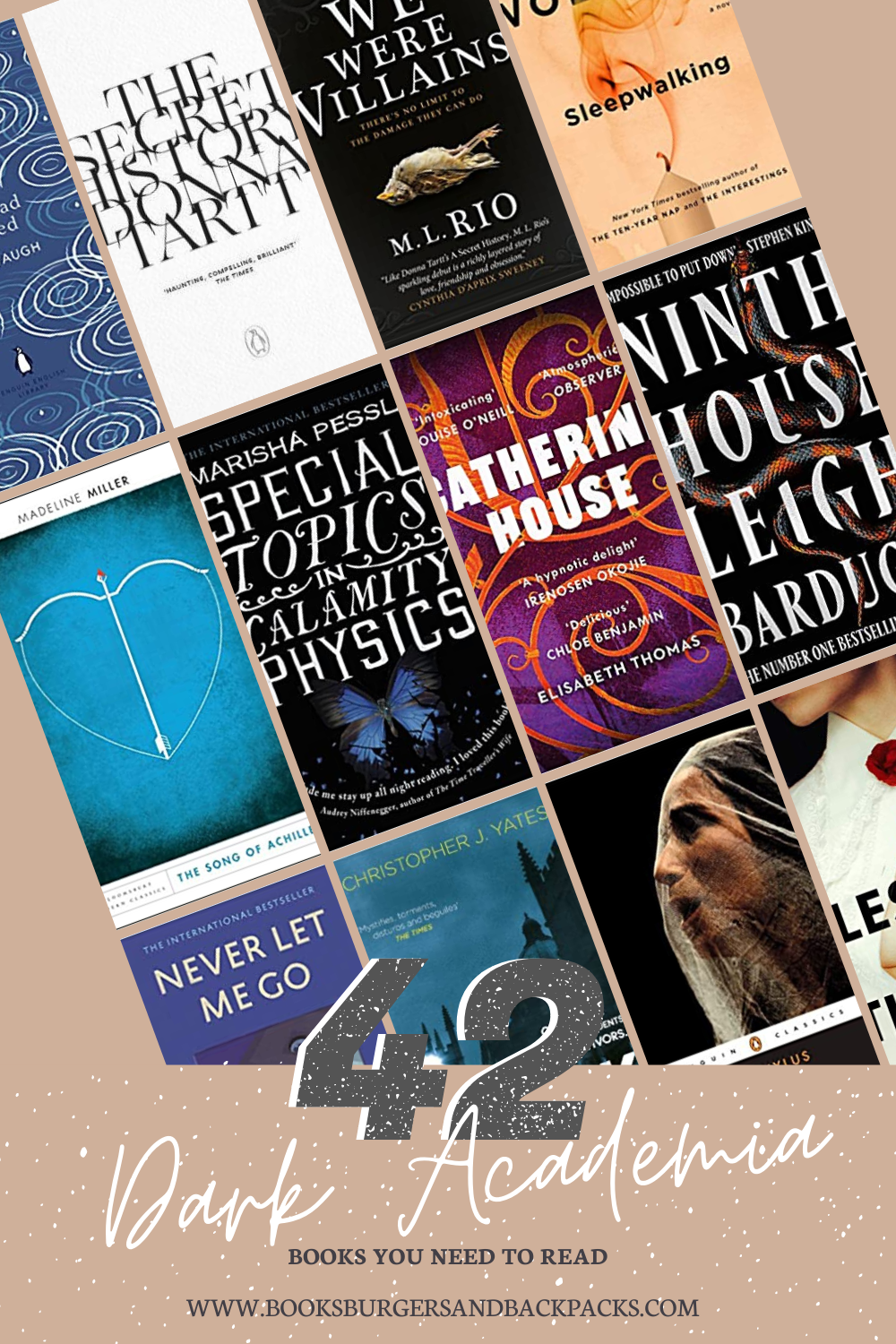Dead Poets
-
Douglas Mercer
- Posts: 10948
- Joined: Tue Mar 28, 2023 7:29 pm
Dead Poets
Douglas Mercer
September 14 2024
Dark academia is an internet aesthetic and subculture concerned with higher education, the arts and literature or an idealized version thereof. The aesthetic centers on traditional educational clothing, interior design, activities such as writing, poetry, and ancient art and classic literature, as well as classical Greek and Collegiate Gothic architecture.
What Dark Academia really is is a tentative groping after truth by those who have been so beaten down by our culture that they can only gingerly indulge their deep down penchant for the lure of the real, what is seen as a guilty pleasure. It is the central pathway on the road to truth but in our degraded world everything devolves into a compartmentalized niche, or a subculture or, most interestingly, an aesthetic. An aesthetic is a look or a subworld that one can plunge into which has its own code words, its only melodies, its own writing, it colors and its ambience, it’s architecture, its own shades and aspects and hues—essentially it has its own heraldry.
Dark Academia is overwhelmingly White and it centers around the things that became verboten some decades ago under the rubric “Dead White Males.” As such it is intrinsically suspect to the ones who snuff, scan and sniff through every ideology or fad and titrate it for signs of Whiteness. Some among the devotees of the coteries have buckled a bit and included the likes of nonentity Langston Hughes, presumably as a substitute for Ted Hughes, who hit all the erogenous zones of the aesthetic, mad as Ophelia crazy poet wife, dream poet himself, and a stalwart defender of the English canon, and recondite explicator of the secrets of Shakespeare.
And that’s just it, this is reality not a niche, culture itself in all of its standoffish imperiousness, is not a carved-out section of opinion neither more nor less true that any other, true culture (the only culture, our culture) is the real McCoy, the others being mere pale simulacra or facsimiles thereof. For culture is and always has been a protected preserve of the few, the elite, and the superior and the advanced.
It will always be an acquired taste and will always be caviar to the multitude. And as such it has the cachet—you even see the middle brow queen of music Taylor Swift trying to get in on the act with her “tortured poets department” but her ersatz lyrics give her game away as a sheen chasing harlot. And certainly the denizens of this aesthetic do not have the fanaticism and the discipline to see it thought to the end—but at least somewhere in the dim recesses of their vague and guilt ridden minds they are able to recognize the spurious nature of the reality they are being force fed and are drawn and lured into what is true and beautiful.
Among the noted activities of this set is daydreaming, the fashion of the 1930s and 1940s, clothing associated with attendance at Oxford and Cambridge and prep schools of the period, cardigans, blazers, dress shirts, plaid skirts, Oxford Shoes and clothing made of hounds tooth and tweed, its color palette consisting mainly of black, white, beige, browns, dark green, and occasionally navy blue, calligraphy, museum visits, libraries, coffee shops, and all-night studying sessions, moody architecture, philosophical pessimism, and melancholy. If the erogenous zones of Illyria and Elysium, of the faun filled meadows and the fragrant temple groves have ever been more squarely set forth I for one have never head tell of it.
The academy today is rife with insipid ideologies of colonial and critical race studies, that is it has displaced actual culture with an anti-culture, that is truth and beauty buried be and sinister fakes rule the day. But once the academy was that of Plato, the groves of academe where the peripatetic strolled and the soul had wings, the Queen Aphrodite was playful as a pussycat, fastidious and precise, where Divine Love was the object, and truth and beauty ruled, and the feather shaft opened up as the memories of the future were recollected in calm repose.
The library is always bathed in occluded light, swept by chiaroscuro and silence is supposed to reign, where the vain babble of the world is at an end and thinking is given a try. In this fatal grove Divine Love is the object and truth and beauty are held up to the light even as the feather shafts open up and let the new growth in. In a certain manner of speaking it is philosophy as therapy, talk therapy, where the healing power grows and the power of thought and everything specious meets its end. But therapy is a recovery from trauma and in this sweet endeavor confusion reigns for a time, for the pinpoint of light is well guarded by auroras of darkness, and only out of pure evil can the truth finally emerge. For after all as the divine light that pours through we still call it Dark Academia. Why? Because no man who dwells in the vicinity of Divine Love comes away unsigned, indeed the burning is the point from the beginning.
***
We can notice that just as Whiteness began to be purged from the real-world academy counter efforts were made in an opposite direction. The movie Dead Poets Society (1989) is listed as one of the obsessions of this aesthetic and you can see why; it is set in the requisite prep school and a new teacher with the rather unsubtle name of John Keating (what gods are these? what maiden loth? what mad pursuit?) takes some rather complacent and indifferent charges and imbues them with the holy fire of poesy.
In the course of the movie they go into a cave (a la Plato) and are touched by the enthusiasm of poetic initiates; naturally disaster strikes in the form of a suicide and the parents corralling the teacher due to his corruption of the students (the charge Socrates went up on); this is a rather middling movie altogether but is has all the hallmarks and themes of the aesthetic: poetry, alienation, suicide, conflict with society.
The book Sexual Personae (1990) is paean to the dark chthonic powers, the repressed Dionysian spirit of the ancient Greeks in all of its power and splendor. This is a world of primal and primordial forces of amorality and aggression—dark powers which lie beneath. At the center of it is art where chaos, disorder break through in burning passion and the word reverberates to the very depth of its speaking, unearthing a lost and more purely beautiful world. In this eruption of chaos lies danger, the danger of becoming in touch with the sacred and holy power of the gods—from which life alone comes though ringed with monstrous visions. The book is a conjuring with these powers and is a prototype of the aesthetic of Dark Academia.
If there is one book that most neatly and nearly encapsulates the aesthetic it is the 1992 novel The Secret History. Indeed, in its searching of the past for truth the aesthetic is voyaging on a search of a secret history, lost now in the universities that these students inhabit, lost in a welter of consigning such grand thought and poetry to a supposed worn out and evil past. Set in an East Coast prep school the narrator falls in with a group who are studying the classics with a revered teacher.
Here we have the proper role of education harking back to that grove of academe, a milieu of master-students and in which education is not a paper mill but a rite of initiation. Naturally the chthonic and dangerous is referenced under the tutelary god of Plato and his notion of divine madness: “he’s always up in the clouds with Plato,” “the discussion that day was about loss of self, about Plato’s divine madness, and about madness of all sorts,” “do you remember when we studied what Plato called telestic madness? Dionysian frenzy?”
This is the daydream world of the Dark Academic aesthetic in nuce; and naturally in this ritualistic ambience a murder is committed, as the pales and forts of reason are broken down. This is the lure of the real and the lure of the deep where forbidden secrets are explored and acknowledgment is made that at the heart of nature is burning, madness, and the danger of dangers, that famous High Voltage which shocks when touched. This is the world where the Greek Eleusinian mysteries are performed, the world of autopoeisis and hypnagogic trance, where the goddess who had painted all the flowers of the earth goes down to the underworld and the eternity of life that flows by blood from generation to generation is found.
***
No doubt the inhabitants of this aesthetic are only scratching the surface; that there is in this the symbol of the desire for something real is good but that it will be frittered away in mere style and ornament is only to be expected; if one wants academia and darkness one can look to H.P. Lovecraft, one who looked in the horror filled mysteries and ancient runes and the initiation rites of lore and yore and did not blink of blanche; of course in our world Lovecraft is “tarnished” by his “racism” but to see the true darkness our world has descended to one must see an implacable love of the White race and an implacable love of truth as part and parcel.
It was the monstrous race aliens that Lovecraft recoiled from that to his mind symbolized the incestuous grotesques that people his imagination; and to Lovecraft it was his own people who deserved to rule the world, the people from good homes; and his background reads like a roll call of the preoccupations of Dark Academia: recall that the notes of among which the small bas-relief of the dragon like human caricature is found were written by a Brown Professor of linguistics; everything about the tale is redolent of old Anglo-Saxon culture, Brown, head of museums, New England salt of the earth, archeological societies, files moved to Boston, professors emerituses, a sculptor from an excellent family.
The statue itself seem resonant of the Greek, having emanated from the dreams had by a sculptor of great cyclopean cities of titan blocks and sky flung monoliths; this is the constituent part and the interstitial space of the monstrosity, the enormity that our poet intuited was at the heart of being, at the heart of nature; it comes from a seeker after knowledge and from its relentless pursuit.
What you find there is mammoth, a terrifying city teeming with terrifying beings, a single glimpse of forbidden eons which chill when thought on and madden when dreamt; and that other Knight and truth seeker Oedipus when he found what he was looking for discovered a Lovecraftian incestuous swamp himself and so horror laden was it that he plucked out his eyes; so don’t let the tweed and the cardigans and the beige divans, or the calligraphy or the plaid skirts, or the dim foyers, or the trips to the museum and coffee fool you; what the academy is is the piecing together of knowledge; and according to our poet it is this piecing together which leads to the bottomless hole of terror, fate and fear.
That when the disparate knowledge is finally arranged only endless vistas of sickening reality will ensue; but perhaps this in only the penultimate truth, perhaps these are just the gargoyles that guard the gate to the central sanctum in order to scare the faint-hearted; perhaps the links of the chain and the recurring patterns shift a final time; and the trick is to accept all the facets of the psychosis then go straight down through their bottom to where sanity breathes; in the groves of academe after all they stroll all day by the side of an ocean where a woman bathes and divine love is an object; it’s a screen where you cast whatever you want and at the mouth of the river of time you end the heart of darkness by saying ironically the watchword: the horror, the horror.
It is after all what the most ancient inscriptions say when you follow the wild vagaries of the cryptic regularity. In it is the message from all secret societies and secret cults, and it is what happens when you create a monster. Should one read between the lines one will see that all the dead poets say so when they are in a fugue state. For as Lovecraft so aptly said it is from the artists and the poets that the pertinent answers always come, and this is why those youth are so attracted the lure of the deep and the uncanny, by the lure of the real.
September 14 2024
Dark academia is an internet aesthetic and subculture concerned with higher education, the arts and literature or an idealized version thereof. The aesthetic centers on traditional educational clothing, interior design, activities such as writing, poetry, and ancient art and classic literature, as well as classical Greek and Collegiate Gothic architecture.
What Dark Academia really is is a tentative groping after truth by those who have been so beaten down by our culture that they can only gingerly indulge their deep down penchant for the lure of the real, what is seen as a guilty pleasure. It is the central pathway on the road to truth but in our degraded world everything devolves into a compartmentalized niche, or a subculture or, most interestingly, an aesthetic. An aesthetic is a look or a subworld that one can plunge into which has its own code words, its only melodies, its own writing, it colors and its ambience, it’s architecture, its own shades and aspects and hues—essentially it has its own heraldry.
Dark Academia is overwhelmingly White and it centers around the things that became verboten some decades ago under the rubric “Dead White Males.” As such it is intrinsically suspect to the ones who snuff, scan and sniff through every ideology or fad and titrate it for signs of Whiteness. Some among the devotees of the coteries have buckled a bit and included the likes of nonentity Langston Hughes, presumably as a substitute for Ted Hughes, who hit all the erogenous zones of the aesthetic, mad as Ophelia crazy poet wife, dream poet himself, and a stalwart defender of the English canon, and recondite explicator of the secrets of Shakespeare.
And that’s just it, this is reality not a niche, culture itself in all of its standoffish imperiousness, is not a carved-out section of opinion neither more nor less true that any other, true culture (the only culture, our culture) is the real McCoy, the others being mere pale simulacra or facsimiles thereof. For culture is and always has been a protected preserve of the few, the elite, and the superior and the advanced.
It will always be an acquired taste and will always be caviar to the multitude. And as such it has the cachet—you even see the middle brow queen of music Taylor Swift trying to get in on the act with her “tortured poets department” but her ersatz lyrics give her game away as a sheen chasing harlot. And certainly the denizens of this aesthetic do not have the fanaticism and the discipline to see it thought to the end—but at least somewhere in the dim recesses of their vague and guilt ridden minds they are able to recognize the spurious nature of the reality they are being force fed and are drawn and lured into what is true and beautiful.
Among the noted activities of this set is daydreaming, the fashion of the 1930s and 1940s, clothing associated with attendance at Oxford and Cambridge and prep schools of the period, cardigans, blazers, dress shirts, plaid skirts, Oxford Shoes and clothing made of hounds tooth and tweed, its color palette consisting mainly of black, white, beige, browns, dark green, and occasionally navy blue, calligraphy, museum visits, libraries, coffee shops, and all-night studying sessions, moody architecture, philosophical pessimism, and melancholy. If the erogenous zones of Illyria and Elysium, of the faun filled meadows and the fragrant temple groves have ever been more squarely set forth I for one have never head tell of it.
The academy today is rife with insipid ideologies of colonial and critical race studies, that is it has displaced actual culture with an anti-culture, that is truth and beauty buried be and sinister fakes rule the day. But once the academy was that of Plato, the groves of academe where the peripatetic strolled and the soul had wings, the Queen Aphrodite was playful as a pussycat, fastidious and precise, where Divine Love was the object, and truth and beauty ruled, and the feather shaft opened up as the memories of the future were recollected in calm repose.
The library is always bathed in occluded light, swept by chiaroscuro and silence is supposed to reign, where the vain babble of the world is at an end and thinking is given a try. In this fatal grove Divine Love is the object and truth and beauty are held up to the light even as the feather shafts open up and let the new growth in. In a certain manner of speaking it is philosophy as therapy, talk therapy, where the healing power grows and the power of thought and everything specious meets its end. But therapy is a recovery from trauma and in this sweet endeavor confusion reigns for a time, for the pinpoint of light is well guarded by auroras of darkness, and only out of pure evil can the truth finally emerge. For after all as the divine light that pours through we still call it Dark Academia. Why? Because no man who dwells in the vicinity of Divine Love comes away unsigned, indeed the burning is the point from the beginning.
***
We can notice that just as Whiteness began to be purged from the real-world academy counter efforts were made in an opposite direction. The movie Dead Poets Society (1989) is listed as one of the obsessions of this aesthetic and you can see why; it is set in the requisite prep school and a new teacher with the rather unsubtle name of John Keating (what gods are these? what maiden loth? what mad pursuit?) takes some rather complacent and indifferent charges and imbues them with the holy fire of poesy.
In the course of the movie they go into a cave (a la Plato) and are touched by the enthusiasm of poetic initiates; naturally disaster strikes in the form of a suicide and the parents corralling the teacher due to his corruption of the students (the charge Socrates went up on); this is a rather middling movie altogether but is has all the hallmarks and themes of the aesthetic: poetry, alienation, suicide, conflict with society.
The book Sexual Personae (1990) is paean to the dark chthonic powers, the repressed Dionysian spirit of the ancient Greeks in all of its power and splendor. This is a world of primal and primordial forces of amorality and aggression—dark powers which lie beneath. At the center of it is art where chaos, disorder break through in burning passion and the word reverberates to the very depth of its speaking, unearthing a lost and more purely beautiful world. In this eruption of chaos lies danger, the danger of becoming in touch with the sacred and holy power of the gods—from which life alone comes though ringed with monstrous visions. The book is a conjuring with these powers and is a prototype of the aesthetic of Dark Academia.
If there is one book that most neatly and nearly encapsulates the aesthetic it is the 1992 novel The Secret History. Indeed, in its searching of the past for truth the aesthetic is voyaging on a search of a secret history, lost now in the universities that these students inhabit, lost in a welter of consigning such grand thought and poetry to a supposed worn out and evil past. Set in an East Coast prep school the narrator falls in with a group who are studying the classics with a revered teacher.
Here we have the proper role of education harking back to that grove of academe, a milieu of master-students and in which education is not a paper mill but a rite of initiation. Naturally the chthonic and dangerous is referenced under the tutelary god of Plato and his notion of divine madness: “he’s always up in the clouds with Plato,” “the discussion that day was about loss of self, about Plato’s divine madness, and about madness of all sorts,” “do you remember when we studied what Plato called telestic madness? Dionysian frenzy?”
This is the daydream world of the Dark Academic aesthetic in nuce; and naturally in this ritualistic ambience a murder is committed, as the pales and forts of reason are broken down. This is the lure of the real and the lure of the deep where forbidden secrets are explored and acknowledgment is made that at the heart of nature is burning, madness, and the danger of dangers, that famous High Voltage which shocks when touched. This is the world where the Greek Eleusinian mysteries are performed, the world of autopoeisis and hypnagogic trance, where the goddess who had painted all the flowers of the earth goes down to the underworld and the eternity of life that flows by blood from generation to generation is found.
***
No doubt the inhabitants of this aesthetic are only scratching the surface; that there is in this the symbol of the desire for something real is good but that it will be frittered away in mere style and ornament is only to be expected; if one wants academia and darkness one can look to H.P. Lovecraft, one who looked in the horror filled mysteries and ancient runes and the initiation rites of lore and yore and did not blink of blanche; of course in our world Lovecraft is “tarnished” by his “racism” but to see the true darkness our world has descended to one must see an implacable love of the White race and an implacable love of truth as part and parcel.
It was the monstrous race aliens that Lovecraft recoiled from that to his mind symbolized the incestuous grotesques that people his imagination; and to Lovecraft it was his own people who deserved to rule the world, the people from good homes; and his background reads like a roll call of the preoccupations of Dark Academia: recall that the notes of among which the small bas-relief of the dragon like human caricature is found were written by a Brown Professor of linguistics; everything about the tale is redolent of old Anglo-Saxon culture, Brown, head of museums, New England salt of the earth, archeological societies, files moved to Boston, professors emerituses, a sculptor from an excellent family.
The statue itself seem resonant of the Greek, having emanated from the dreams had by a sculptor of great cyclopean cities of titan blocks and sky flung monoliths; this is the constituent part and the interstitial space of the monstrosity, the enormity that our poet intuited was at the heart of being, at the heart of nature; it comes from a seeker after knowledge and from its relentless pursuit.
What you find there is mammoth, a terrifying city teeming with terrifying beings, a single glimpse of forbidden eons which chill when thought on and madden when dreamt; and that other Knight and truth seeker Oedipus when he found what he was looking for discovered a Lovecraftian incestuous swamp himself and so horror laden was it that he plucked out his eyes; so don’t let the tweed and the cardigans and the beige divans, or the calligraphy or the plaid skirts, or the dim foyers, or the trips to the museum and coffee fool you; what the academy is is the piecing together of knowledge; and according to our poet it is this piecing together which leads to the bottomless hole of terror, fate and fear.
That when the disparate knowledge is finally arranged only endless vistas of sickening reality will ensue; but perhaps this in only the penultimate truth, perhaps these are just the gargoyles that guard the gate to the central sanctum in order to scare the faint-hearted; perhaps the links of the chain and the recurring patterns shift a final time; and the trick is to accept all the facets of the psychosis then go straight down through their bottom to where sanity breathes; in the groves of academe after all they stroll all day by the side of an ocean where a woman bathes and divine love is an object; it’s a screen where you cast whatever you want and at the mouth of the river of time you end the heart of darkness by saying ironically the watchword: the horror, the horror.
It is after all what the most ancient inscriptions say when you follow the wild vagaries of the cryptic regularity. In it is the message from all secret societies and secret cults, and it is what happens when you create a monster. Should one read between the lines one will see that all the dead poets say so when they are in a fugue state. For as Lovecraft so aptly said it is from the artists and the poets that the pertinent answers always come, and this is why those youth are so attracted the lure of the deep and the uncanny, by the lure of the real.








